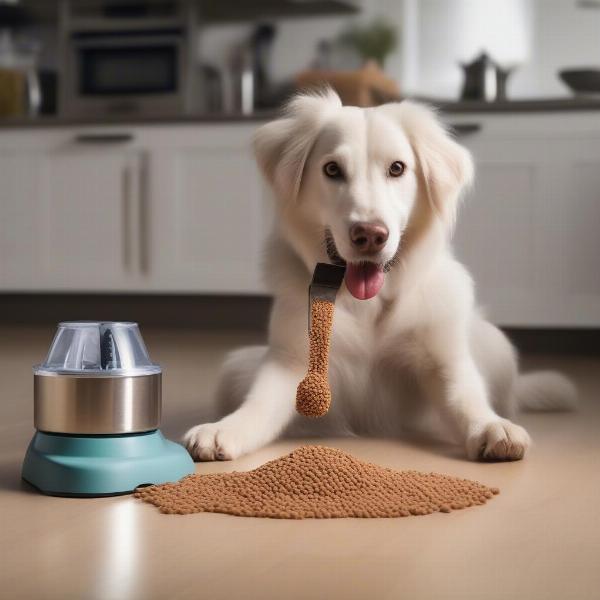Dog food mixers are a fantastic way to enhance your furry friend’s meals, providing a nutritional boost and enticing even the pickiest eaters. Whether you’re looking to add vitamins, support a specific health need, or simply make mealtimes more exciting, understanding the world of dog food mixers can significantly benefit your canine companion. This guide explores everything you need to know about using dog food mixers effectively and safely.
What are Dog Food Mixers and Why Should You Consider Them?
Dog food mixers are supplements designed to be added to your dog’s regular kibble or wet food. They come in various forms, including powders, toppers, broths, and even freeze-dried raw ingredients. These additions offer numerous benefits, from addressing nutritional deficiencies to enticing dogs with a flagging appetite.  Dog enjoying food mixer with tail wagging
Dog enjoying food mixer with tail wagging
Nutritional Benefits of Dog Food Mixers
Many dog food mixers offer targeted nutritional support, such as added vitamins, minerals, probiotics, or joint supplements. These can be especially beneficial for dogs with specific health needs, such as allergies, digestive issues, or joint pain. Always consult your veterinarian before introducing new supplements to your dog’s diet, especially if they have pre-existing health conditions.
Enhancing Palatability with Dog Food Mixers
Picky eaters can be a challenge, but dog food mixers can turn mealtime into a more enjoyable experience. wholesome blend dog food can be enhanced with flavorful toppers that add variety and entice even the most discerning canine palate. Mixers can also help hydrate dry kibble, making it more appealing and easier to digest.
Choosing the Right Dog Food Mixer for Your Dog
With a plethora of options available, selecting the right dog food mixer can be daunting. Consider your dog’s age, breed, activity level, and any specific health needs.
Tailoring Mixers to Specific Needs
- Puppies: Look for mixers rich in calcium and other essential nutrients to support growth and development.
- Senior Dogs: Consider mixers that promote joint health and cognitive function.
- Active Dogs: Opt for mixers that provide extra protein and energy for sustained performance.
- Dogs with Allergies: Choose hypoallergenic mixers free from common allergens like grains, chicken, and beef. dog food for allergies provides comprehensive information on managing food allergies in dogs.
Types of Dog Food Mixers
- Powders: Offer a convenient way to add vitamins, minerals, and other supplements.
- Toppers: Provide a flavorful boost and often come in gravy, stew, or freeze-dried forms.
- Broths: Can add moisture and flavor, particularly appealing to picky eaters.
- Freeze-Dried Raw: Offer a minimally processed option with a high nutrient density.
How to Introduce a Dog Food Mixer to Your Dog’s Diet
Introducing a new food mixer should be a gradual process to avoid digestive upset. Start by adding a small amount to your dog’s regular food and gradually increase the portion over several days. Monitor your dog for any signs of digestive issues, such as vomiting or diarrhea.
Monitoring Your Dog’s Response
Pay close attention to your dog’s overall health and well-being after introducing a new mixer. Observe their coat, energy levels, and stool quality. If you notice any adverse reactions, discontinue use and consult your veterinarian.
Dog Food Mixers: Are They Necessary?
While a complete and balanced commercial dog food should provide all the necessary nutrients, dog food mixers can offer additional benefits. They can address specific dietary needs, boost palatability, and add variety to your dog’s diet. meal mixers for dogs offers a deeper dive into the benefits and considerations.
Conclusion
Dog food mixers can be a valuable addition to your dog’s diet, offering nutritional support and enhancing mealtime enjoyment. By carefully selecting a mixer that meets your dog’s individual needs and introducing it gradually, you can provide a positive impact on their overall health and well-being.
FAQ
- Are dog food mixers safe? Generally, yes, but always choose high-quality products and consult your veterinarian before introducing a new mixer, especially if your dog has health concerns.
- How much mixer should I give my dog? Follow the manufacturer’s instructions and adjust based on your dog’s individual needs and response.
- Can I make my own dog food mixers? Yes, you can create homemade mixers using ingredients like pureed vegetables, plain yogurt, or cooked meat. Ensure these additions are safe and appropriate for dogs.
- Are dog food mixers expensive? The cost varies depending on the type and brand. There are affordable options available, as well as premium mixers with specialized ingredients.
- Can I use a mixer with wet food? Yes, many mixers are suitable for both wet and dry food.
About ILM Dog:
ILM Dog is your trusted international resource for all things dog-related. We provide expert advice on dog breeds, health, training, nutrition, grooming, and more. From puppy care to senior dog support, we cover every aspect of dog ownership. ILM Dog also offers valuable insights into dog products and accessories. For expert advice and to enhance your dog’s well-being, contact us at [email protected] or call us at +44 20-3965-8624. Visit us at ILM Dog for more information.